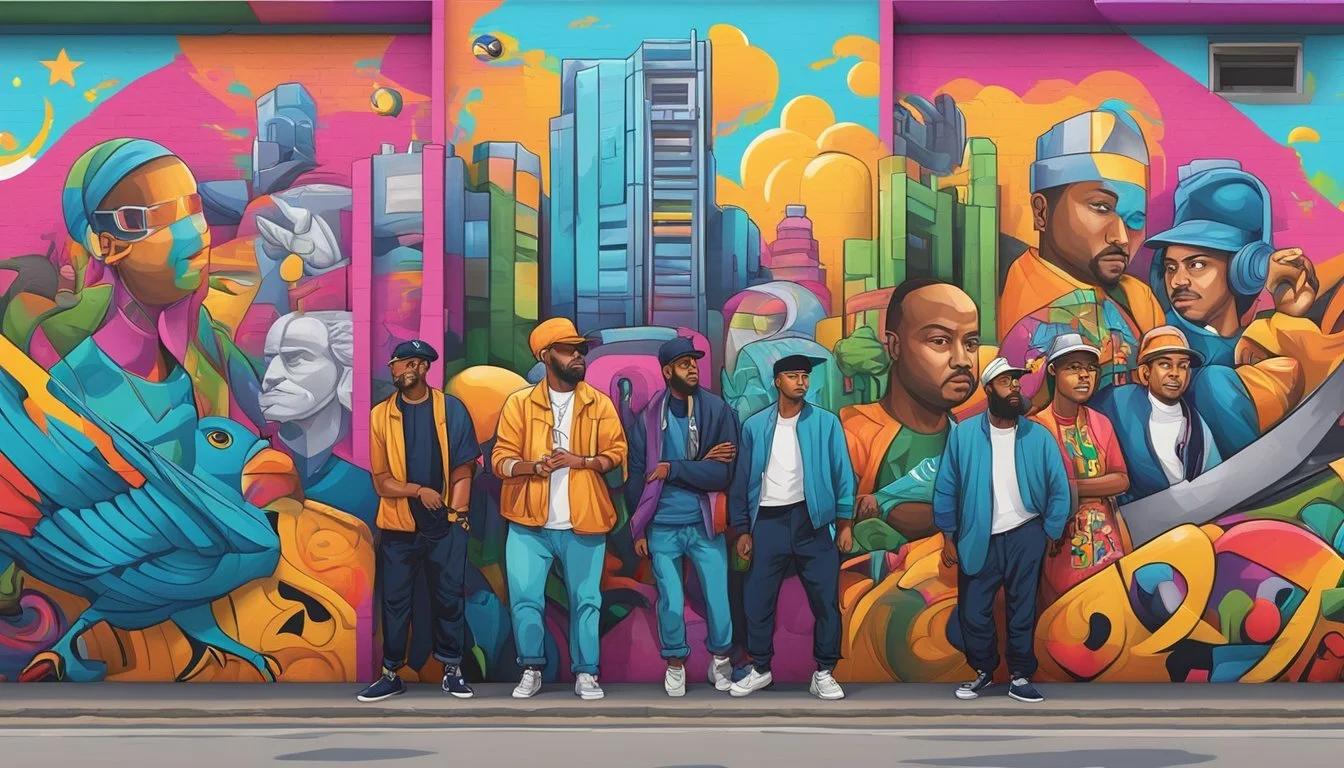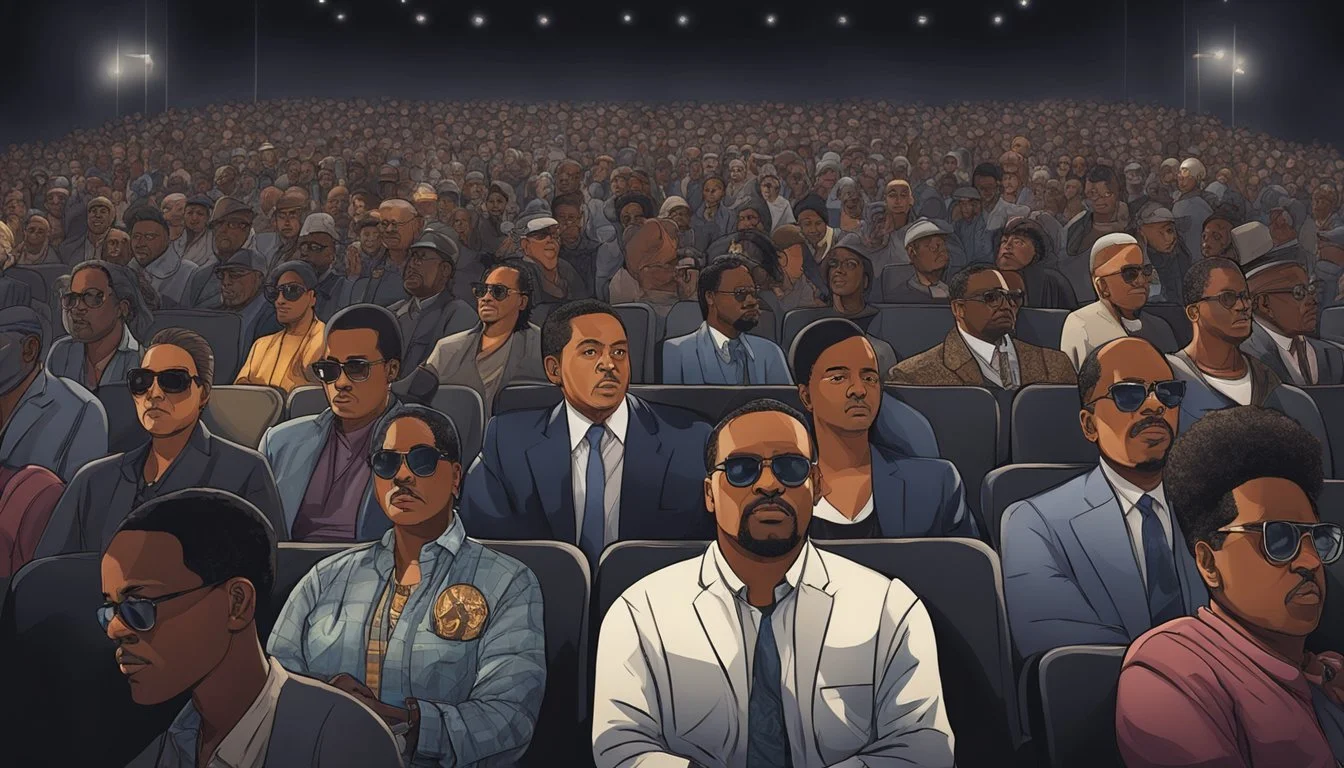Inside the BMF: Shocking Secrets of America's Infamous Cocaine Empire Revealed!
The BMF Documentary: Blowing Money Fast offers viewers an inside look at one of America's most notorious criminal organizations. This eight-episode series explores the rise and fall of the Black Mafia Family, a cocaine empire founded by brothers Demetrius "Big Meech" and Terry "Southwest T" Flenory.
The documentary provides a comprehensive examination of how the Flenory brothers built their empire from Detroit to Atlanta, becoming one of the largest cocaine distribution networks in American history. Through interviews with those involved and expert analysis, the series paints a vivid picture of the BMF's operations, lifestyle, and eventual downfall.
Directed by Shan Nicholson and Chris Frierson, with Curtis "50 Cent" Jackson as an executive producer, the documentary brings together various perspectives to create a nuanced portrayal of the Black Mafia Family. It delves into the complex dynamics within the Flenory family and the broader impact of their criminal enterprise on communities across the United States.
Origins of the Black Mafia Family
The Black Mafia Family (BMF) emerged from humble beginnings in Detroit to become one of the largest cocaine distribution networks in American history. Founded by brothers Demetrius "Big Meech" and Terry "Southwest T" Flenory, BMF's rise was marked by shrewd business acumen and relentless ambition.
Detroit Roots and Flenory Brothers
Demetrius and Terry Flenory grew up in a working-class neighborhood in Detroit during the 1980s. Facing limited economic opportunities, the brothers turned to selling drugs as teenagers. They started small, dealing cocaine on street corners.
The Flenory brothers quickly gained a reputation for reliability and quality product. Their operation expanded rapidly throughout Detroit. By the early 1990s, they had established a significant presence in the city's drug trade.
BMF's success was built on the brothers' complementary skills. Demetrius was charismatic and handled street-level operations. Terry focused on logistics and money management.
Early Operations and Expansion
In the mid-1990s, BMF began expanding beyond Detroit. The organization established distribution hubs in major cities across the United States. Atlanta became a key stronghold for their operations.
BMF developed a sophisticated distribution network. They used coded language and strict organizational hierarchy to avoid detection. The group also laundered money through legitimate businesses.
By the early 2000s, BMF was moving thousands of kilograms of cocaine monthly. Their empire stretched from Los Angeles to New York. The organization's influence extended into the music industry and popular culture.
BMF's rapid growth caught the attention of law enforcement. Despite increased scrutiny, the organization continued to thrive for several years. Their success was fueled by strategic alliances with Mexican drug cartels and innovative smuggling techniques.
Rise to Power
The Black Mafia Family (BMF) ascended rapidly from street-level drug dealing to a nationwide cocaine empire. Their meteoric rise involved building vast distribution networks, forming high-level cartel connections, and leveraging their criminal success to establish a presence in the entertainment industry.
Cocaine Empires
BMF began in Detroit in the late 1980s, founded by brothers Demetrius "Big Meech" and Terry "Southwest T" Flenory. They quickly expanded beyond local street sales to wholesale cocaine distribution. The organization developed sophisticated smuggling and money laundering operations. BMF established direct connections with Mexican cartels to obtain large quantities of cocaine at lower prices. This allowed them to undercut competitors and dominate markets across the United States.
Nationwide Growth and Infamy
By the early 2000s, BMF had distribution hubs in major cities like Atlanta, Los Angeles, and Chicago. Their network spanned at least 11 states. The organization was known for its flashy lifestyle and lavish spending. BMF threw extravagant parties attended by celebrities. They gained a reputation for violence in defending their territory. The group's expansion brought increased scrutiny from law enforcement. Despite this, BMF continued to grow, at its peak trafficking hundreds of kilograms of cocaine monthly.
Cultural Impact and Entertainment Ventures
BMF leveraged its street credibility and wealth to enter the music industry. In 2000, they founded BMF Entertainment as a record label and promotions company. The label signed several up-and-coming rap artists. BMF Entertainment organized concerts and events, further raising the organization's profile. Their association with popular rappers helped glamorize the drug trade in hip-hop culture. The Flenory brothers became known figures in the rap world, mingling with established artists. This blending of criminal and entertainment enterprises became a signature aspect of BMF's operations and legacy.
Legal Battles and Law Enforcement
The BMF's rapid expansion and high-profile activities drew intense scrutiny from law enforcement agencies. This led to numerous arrests, trials, and complex interactions with the legal system.
Notable Arrests and Trials
In 2005, a major breakthrough came for law enforcement when they arrested Demetrius "Big Meech" Flenory and Terry "Southwest T" Flenory. The brothers faced charges of running a continuing criminal enterprise and money laundering conspiracy.
The trial garnered significant media attention. Prosecutors presented evidence of the BMF's extensive drug trafficking operations and lavish lifestyle. Several associates turned state's witnesses, providing damaging testimony against the organization.
In 2008, both Flenory brothers pleaded guilty to charges of running a continuing criminal enterprise. They received sentences of 30 years in federal prison.
Interactions with Legal System
BMF's legal troubles extended beyond its leadership. Numerous members faced arrests and convictions for drug trafficking, money laundering, and violence.
The organization's attempts to legitimize through BMF Entertainment complicated matters. Prosecutors argued this was merely a front for illegal activities.
BMF's high-powered legal team fought vigorously, challenging evidence and negotiating plea deals. However, the sheer scale of evidence proved overwhelming.
The legal battles highlighted the challenges of prosecuting large-scale drug organizations. They also sparked debates about mandatory minimum sentences and their impact on urban communities.
The BMF Documentary
The BMF Documentary: Blowing Money Fast offers an in-depth look at the infamous Black Mafia Family. This eight-episode series explores the rise and fall of one of America's largest cocaine empires, founded by brothers Demetrius "Big Meech" and Terry "Southwest T" Flenory.
Production and Release
The documentary was executive produced by Curtis "50 Cent" Jackson through G-Unit Film and Television, in collaboration with Alex Gibney's Jigsaw Productions. It premiered on Starz on October 23, 2022, airing at 10 pm ET/PT.
Each episode runs for approximately 30 minutes, providing a compact yet comprehensive examination of the BMF story. The series serves as a companion piece to the dramatized BMF television show, offering viewers real-life insights into the events portrayed in the fictional series.
Episodic Synopsis
The documentary series unfolds across eight episodes, each focusing on different aspects of the Black Mafia Family's operations and key players. Episodes delve into the Flenory brothers' early lives, their rise to power in Detroit's drug trade, and the expansion of their empire to other major U.S. cities.
Later installments examine the law enforcement efforts to bring down BMF, the eventual arrests of Big Meech and Southwest T, and the aftermath of their empire's collapse. The series features interviews with former BMF members, law enforcement officials, and family members of those involved.
Critical Reception
Critics praised The BMF Documentary for its thorough research and compelling storytelling. Many noted the series' ability to balance the sensational aspects of the BMF story with a nuanced examination of the social and economic factors that contributed to the organization's rise.
Some reviewers highlighted the documentary's use of archival footage and photographs, which helped bring the historical narrative to life. The inclusion of diverse perspectives, from both sides of the law, was also commended for providing a well-rounded view of the BMF saga.
A few critics felt certain episodes could have delved deeper into specific topics. Overall, the series was recognized for its contribution to true crime documentaries and its exploration of a significant chapter in American criminal history.
Cultural Influence and Legacy
The Black Mafia Family's impact extended far beyond their criminal enterprise. BMF's story has captured public imagination, influencing popular culture and leaving an enduring mark on American society.
BMF in American Culture
BMF's rise and fall has become a subject of fascination in American media. The 2021 television series "BMF," produced by Curtis "50 Cent" Jackson, dramatizes the Flenory brothers' story. This show has introduced BMF to a new generation of viewers, sparking renewed interest in their legacy.
Books and documentaries have further explored BMF's history. The 2022 documentary series delves into the organization's inner workings and its place among American cocaine empires. These productions have cemented BMF's status as a significant chapter in recent American history.
Impact on Hip-Hop Music and Industry
BMF's influence on hip-hop culture is undeniable. The organization's extravagant lifestyle and connections to the music industry left a lasting impression. Many rap artists, including P. Diddy and Lil Jon, had associations with BMF.
References to BMF and Big Meech frequently appear in rap lyrics. This has contributed to the mythologization of the organization within hip-hop culture. BMF's story continues to inspire artists, serving as a cautionary tale and a symbol of street credibility.
The legacy of BMF extends to entrepreneurship in the music industry. Their approach to business, albeit illegal, has influenced how some artists approach their careers and brand-building efforts.
Modern-Day BMF and Media Portrayal
The Black Mafia Family's story has captivated audiences through various media adaptations. These portrayals have brought renewed attention to the Flenory family and their infamous criminal enterprise.
Television and Film Adaptations
Starz network has produced multiple projects centered on BMF. The scripted drama series "BMF" premiered in 2021, dramatizing the rise of Demetrius "Big Meech" and Terry "Southwest T" Flenory. This fictionalized account garnered significant viewership on the streaming platform.
In 2022, Starz released "The BMF Documentary: Blowing Money Fast," an eight-part docuseries. This non-fiction exploration features interviews with former members, associates, and celebrity figures connected to BMF. It offers an inside look at the organization's meteoric ascent and eventual downfall.
The documentary series delves into BMF's Atlanta operations, where they established East Coast headquarters and launched an entertainment company. It highlights the lavish lifestyle of BMF members, including extravagant spending at clubs and associations with hip-hop stars.
BMF and P-Valley in Popular Media
BMF's influence extends beyond true crime narratives. The Starz drama "P-Valley" incorporates elements inspired by BMF's story. This fictional series, set in Mississippi, explores themes of power, money, and the underground economy.
The intersection of BMF and "P-Valley" in Starz's lineup reflects the network's focus on gritty, Southern-set dramas. Both shows have contributed to increased subscriber growth for the streaming service.
BMF's legacy continues to resonate in popular culture. Music references, fashion trends, and social media discussions keep the organization's notoriety alive. This sustained interest has sparked debates about the glorification of criminal lifestyles in media.
Viewing Experience
The BMF Documentary offers viewers an in-depth look at the notorious Black Mafia Family through various streaming platforms. Understanding how to access and navigate this compelling series enhances the overall viewing experience.
Availability on Streaming Platforms
The BMF Documentary: Blowing Money Fast is accessible on several major streaming services. Starz serves as the primary platform, offering the series through its standalone app and channel add-ons for Apple TV and Amazon Prime Video.
Hulu also includes the documentary in its lineup, providing another convenient option for subscribers. Spectrum On Demand makes the series available to its customers, expanding reach to cable subscribers.
For those with YouTube TV, the documentary can be streamed live, adding a real-time viewing option. This wide availability ensures that interested viewers have multiple ways to access the content.
Viewer's Guide to the BMF Documentary
The BMF Documentary focuses on Meech's time in Atlanta, where he established the East Coast headquarters of the Black Mafia Family. It chronicles the organization's rise in the drug trade and their foray into the entertainment industry.
Viewers can expect firsthand accounts from BMF members, insiders, and associates. Celebrity figures close to the Flenory family also provide insights, offering a multi-faceted perspective on the organization's history.
The series details the lavish lifestyle of BMF members, including extravagant spending on nightlife and interactions with music industry figures like P. Diddy and Lil Jon. This narrative approach combines elements of true crime and music industry storytelling.
To enhance the viewing experience, some platforms offer features to optimize video and audio quality during playback. Viewers should check their chosen streaming service for these options to ensure the best possible presentation of the documentary.
Beyond the Documentary
The BMF story extends far beyond the documentary series, inspiring books, articles, and related media. These additional works provide deeper insights into the organization's history and impact.
Books and Articles
Several books explore the rise and fall of BMF. "BMF: The Rise and Fall of Big Meech and the Black Mafia Family" by Mara Shalhoup offers a detailed account of the organization's operations. The book delves into BMF's cocaine empire and its influence on the Detroit drug landscape.
"The Takedown: A Suburban Mom, A Coal Miner's Son, and the Unlikely Demise of Colombia's Brutal Norte Valle Cartel" by Jeffrey Robinson examines BMF's connections to Colombian cartels. This work provides context for the organization's international reach.
Numerous articles in magazines and newspapers have covered BMF's story. Publications like Rolling Stone and The Atlanta Journal-Constitution have published in-depth pieces on the Flenory brothers and their empire.
Related Documentaries and Shows
"BMF" is a dramatized series on Starz that portrays the Flenory brothers' journey. The show offers a fictionalized account of BMF's rise in Detroit and expansion to other cities.
"Gangland" featured an episode titled "Black Mafia" that focused on BMF's operations. This documentary series provided an early look at the organization's structure and tactics.
"American Gangster" dedicated an episode to Big Meech, offering insights into his leadership style and BMF's influence on hip-hop culture. The episode explored the East Coast BMF headquarters and its role in the organization's growth.
Personal Narratives and Interviews
The BMF documentary features intimate accounts from family members, law enforcement officials, and former associates. These firsthand perspectives provide a multifaceted view of the organization's inner workings and impact.
Insights from the Flenory Family
Nicole Flenory, sister of Demetrius "Big Meech" and Terry Flenory, offers unique insights into her brothers' early lives. She describes their childhood in Detroit and the circumstances that led them to form BMF. Other family members share stories of the organization's rise to power and the strain it placed on their relationships.
The documentary explores the complex dynamics within the Flenory family. It highlights the brothers' close bond and their diverging paths as the empire grew. Family interviews reveal the personal cost of BMF's illegal activities and the lasting impact on their lives.
Law Enforcement Perspectives
Former DEA agents and local police officers provide detailed accounts of their efforts to bring down BMF. They describe the challenges of infiltrating the organization and gathering evidence. These interviews offer a behind-the-scenes look at the investigative techniques used to track BMF's operations across multiple states.
Law enforcement perspectives shed light on the scale of BMF's drug empire. Officers discuss the gang wars sparked by BMF's expansion and the violence that ensued. Their testimonies paint a picture of the organization's far-reaching influence and the resources required to dismantle it.
Personal Stories from Associates
Former BMF members and street-level dealers share their experiences within the organization. These narratives offer glimpses into the day-to-day operations of the drug empire. Associates describe the allure of quick money and the harsh realities of life in the drug trade.
The documentary features interviews with individuals who witnessed BMF's impact on their communities. These personal stories illustrate the social consequences of the drug trade. They also provide context for understanding BMF's rise to power and its eventual downfall.
The Cultural Scene During BMF's Heyday
The 1990s and early 2000s saw a vibrant cultural landscape shaped by hip-hop, extravagant lifestyles, and urban fashion. This era coincided with the rise of the Black Mafia Family (BMF) and influenced their operations and image.
The Allure of Dance Clubs and Nightlife
Dance clubs became epicenters of urban nightlife during BMF's prime. These venues pulsated with hip-hop and R&B, drawing crowds eager to see and be seen. VIP sections were coveted spaces where high rollers flaunted their wealth.
Bottle service emerged as a status symbol. Patrons ordered expensive champagne, often spraying it in celebratory displays. Strippers gained prominence, performing in clubs and private parties. Their presence added to the atmosphere of excess and indulgence.
BMF members frequented these hotspots, building relationships and showcasing their affluence. The nightclub scene became intertwined with their operations and public image.
Fashion and Lifestyle
Urban fashion took center stage during this period. Designer labels and flashy jewelry became hallmarks of success. Baggy jeans, oversized t-shirts, and luxury brands like Gucci and Louis Vuitton dominated streetwear.
Customized vehicles with expensive rims and sound systems were prized possessions. Lavish homes and extravagant parties demonstrated one's status. BMF embraced this lifestyle, using it to attract attention and respect.
Hip-hop artists often referenced this culture in their music and videos. This cross-pollination between music, fashion, and street life created a distinct aesthetic that defined the era.







